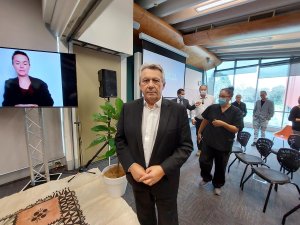Respiratory physician Lutz Beckert considers chronic obstructive pulmonary disease management, including the prevention of COPD, the importance of smoking cessation and pulmonary rehabilitation, and the lifesaving potential of addressing treatable traits. He also discusses the logic of inhaler therapy, moving from single therapy to dual and triple therapy when indicated, as well as other aspects of management
‘Imposing a system won’t work’: Campbell wants agency to work inclusively with primary care
‘Imposing a system won’t work’: Campbell wants agency to work inclusively with primary care

Kia ora, please enjoy our Summer Hiatus selection of stories and comment from throughout 2023, curated by our editorial team. This article was first published on 15 March. We will be back from our summer break on 15 January. Happy reading
Chosen by Barbara: Sacked but not silenced, former Te Whatu Ora board chair Rob Campbell continued to comment on the health reforms throughout the year. Martin Johnston caught up with him early on
"We fell victim to consultancy-itis or whiteboard-warriordom. I was part of it and I think we have got to shake it off"
In a frank interview, former Te Whatu Ora chair Rob Campbell tells Martin Johnston how the health reforms are going, why he was cautious on capitation funding and how much he earned
It may not matter any more what Rob Campbell thinks about health but, for the record, he says Te Whatu Ora has been on the wrong track with primary care.
The professional director was sacked as a Te Whatu Ora board member and chair last month for being too politically outspoken.
He seems almost relieved at being able to tell all-comers, including New Zealand Doctor Rata Aotearoa, what he thinks. And Mr Campbell thinks a lot. It was his criticism on LinkedIn of National leader Christopher Luxon and the party’s water services policy that led to Labour ministers removing Mr Campbell from both Te Whatu Ora and the Environmental Protection Authority, where he was chair.
The policy wasn’t sensible, he posted, and was a thinly disguised dog-whistle on co-governance.
Earlier, on 24 February, Mr Campbell had led a Te Whatu Ora meeting discussion on general practice ownership models and capitation. In a media briefing afterwards, he said the board was getting plenty of advice but hadn’t reached any conclusions.
Now, in a frank interview, the former chair says the organisation has taken the wrong approach to primary care.
Asked how the health reforms can realise the potential gains from high-quality primary care, Mr Campbell says: “I originally thought you probably could, from the centre, make some structure/policy decisions and it would work that way.
“[But] I think we have been pursuing it the wrong way. We fell victim to consultancy-itis or whiteboardwarriordom. I was part of it and I think we have got to shake it off.
“I don’t think much progress can be made without a much more inclusive process of people working in the primary sector…I have been advocating for some time that we should be swapping personnel backwards and forwards with people in [primary care].
“As a new model emerges, I don’t believe any longer that trying to impose a system to replace the current system is worthwhile…
“Not many issues are solved by experts, whether Ministry of Health, Te Whatu Ora or consultants. You have to have much more involvement of the people working in the sector.
“I don’t think in Te Whatu Ora we have resolved how we feel about the GP model, the PHO model, the corporate practice model…Those are forms and ways of doing things that are emerging from reality out in the health market.
We’ve got to understand and engage with that rather than try and dream up some new system and impose that.”
Mr Campbell says he was cautious about making decisions based on last year’s Sapere report on capitation, because of the risk of seeing primary care as more straightforward than it is.
“The issue is not really just about capitation,” he says.
“It’s about what you’re trying to fund and why, and then comes the how.”
- 23 September 2021 Appointment as chair of Interim Health New Zealand announced.
- 1 July 2022 Starts as chair of Te Whatu Ora – Health New Zealand.
- 26 February 2023 On LinkedIn criticises National’s water services policy.
- 28 February 2023 Sacked as chair and member of Te Whatu Ora board.
- 2 March 2023 Sacked as chair and member of the Environmental Protection Authority board.
Mr Campbell says he apologised to Mr Luxon for any personal slight he may have felt, and to health minister Ayesha Verrall and environment minister David Parker for any difficulty he caused to them or the Government.
But he maintains the interpretation the ministers placed on his LinkedIn post, in light of the Code of Conduct for Crown entity board members, is wrong.
The code requires political impartiality and, Mr Campbell points out, that board members bring a desire to improve the wellbeing of New Zealanders, including Māori, consistent with Te Tiriti o Waitangi.
Impartiality does not mean silence, he says. It means not favouring one group over another.
“I regard myself as an equal opportunity critic. I never restrict myself to only criticising National or Act and I do sometimes criticise Labour.”
Mr Campbell also claims to have been acting in a private capacity with his LinkedIn post, but he says the interpretation by the Government and its advisor, public service commissioner Peter Hughes, “seems to be that you don’t ever have a private capacity”.
No one has suggested, he says, that he jeopardised his ability to act as Te Whatu Ora chair by expression of his well-known political views. (That would have been a breach of the code.)
He calls the Government’s response “Muldoonist” – a reference to conflict during his union-leader days with 1975 to 1984 prime minister Rob Muldoon.
It’s not the first time Mr Campbell has irritated ministers since his health appointment. Then-health minister Andrew Little took him to task last year for his advocacy of Green MP Chloe Swarbrick’s alcohol control bill. Dr Verrall took exception to the strength of his views on co-governance, indicating they should be toned down, Mr Campbell says.
He agreed to let her see advance copies of speeches on major policies, under the no-surprises procedure, “which I would have done, had this [LinkedIn post] been a Te Whatu Ora statement”.
Dr Verrall’s office did not respond by deadline to a request for a copy of her media statement on Mr Campbell; Mr Parker’s is on the Beehive website and says he accepted Mr Hughes’ advice the LinkedIn post breached the code.
“Also,” Mr Parker says, “his subsequent public comments in the media suggest he does not accept the constraints he is under as a member and chair of a Crown entity board”. That
eroded “my trust and confidence in his ability to effectively undertake his role”.
Bryan Betty, then-medical director of RNZCGP: “The new chair must rapidly understand primary care issues, including workforce, funding and accessibility, and not have just a hospital focus.”
Grant Davidson, chief executive of Hauora Taiwhenua Rural Health Network: “The concern we have is whether it’s going to slow down the reforms, which need to speed up rather than slow down.”
Fepulea’i Margie Apa, Te Whatu Ora chief executive: “Thanks are due to Mr Campbell for the high expectations he set for the health system to hold equity at the front of its work.”
Mr Campbell admits to frustration in dealing with the health bureaucracy which, he says, “squashes the momentum for change as much as it can”.
He says the board and senior management of Te Whatu Ora have done “okay” in establishing the new structures, but the work needs to proceed urgently. In an article for Newsroom, he has foreshadowed the disestablishment of “many hundreds of overhead roles”.
Is he surprised by his very public sacking? “It’s not fun,” he says.
“But it’s evident to me now that the system, the bureaucracy or whatever name you like to give it and my more activist, impatient view were not good partners, really...I think I was a good person to do what most people I meet in the health system want, but I think possibly now in retrospect I wasn’t necessarily the person they wanted to continue pretty much in the same vein with a different front on it.”
The budget for the chair’s fees at Te Whatu Ora was $125,000 a year, based on one day a week, according to Newsroom, equating to about $2400 a day. Mr Campbell acknowledges that would seem high to many people, but he estimates he worked about 70 hours a week, so the year’s budget was used up in roughly three months.
“Since then I haven’t been paid. I’m not making anything out of it but I got annoyed because someone said I was making a huge salary and I wasn’t.
“The problem is the Public Service Commission and the Ministry of Health didn’t understand how demanding this job was and is. They have an estimate of running a fully established organisation and it wasn’t [fully established].
We told them that’s ridiculous, this job will never get done for those hours,” he says. So what’s next for the 72-year-old Auckland University of Technology chancellor and former chair of SkyCity and other companies?
“I’ve got plenty of energy left in me, so we’ll just see how we go.”







![Barbara Fountain, editor of New Zealand Doctor Rata Aotearoa, and Paul Hutchison, GP and senior medical clinician at Tāmaki Health [Image: Simon Maude]](/sites/default/files/styles/thumbnail_cropped_100/public/2025-03/Barbara%20Fountain%2C%20editor%20of%20New%20Zealand%20Doctor%20Rata%20Aotearoa%2C%20and%20Paul%20Hutchison%2C%20GP%20and%20senior%20medical%20clinician%20at%20T%C4%81maki%20Health%20CR%20Simon%20Maude.jpg?itok=-HbQ1EYA)
![Lori Peters, NP and advanced health improvement practitioner at Mahitahi Hauora, and Jasper Nacilla, NP at The Terrace Medical Centre in Wellington [Image: Simon Maude]](/sites/default/files/styles/thumbnail_cropped_100/public/2025-03/2.%20Lori%20Peters%2C%20NP%20and%20advanced%20HIP%20at%20Mahitahi%20Hauora%2C%20and%20Jasper%20Nacilla%2C%20NP%20at%20The%20Terrace%20Medical%20Centre%20in%20Wellington%20CR%20Simon%20Maude.jpg?itok=sUfbsSF1)
![Ministry of Social Development health and disability coordinator Liz Williams, regional health advisors Mary Mojel and Larah Takarangi, and health and disability coordinators Rebecca Staunton and Myint Than Htut [Image: Simon Maude]](/sites/default/files/styles/thumbnail_cropped_100/public/2025-03/3.%20Ministry%20of%20Social%20Development%27s%20Liz%20Williams%2C%20Mary%20Mojel%2C%20Larah%20Takarangi%2C%20Rebecca%20Staunton%20and%20Myint%20Than%20Htut%20CR%20Simon%20Maude.jpg?itok=9ceOujzC)
![Locum GP Helen Fisher, with Te Kuiti Medical Centre NP Bridget Woodney [Image: Simon Maude]](/sites/default/files/styles/thumbnail_cropped_100/public/2025-03/4.%20Locum%20GP%20Helen%20Fisher%2C%20with%20Te%20Kuiti%20Medical%20Centre%20NP%20Bridget%20Woodney%20CR%20Simon%20Maude.jpg?itok=TJeODetm)
![Ruby Faulkner, GPEP2, with David Small, GPEP3 from The Doctors Greenmeadows in Napier [Image: Simon Maude]](/sites/default/files/styles/thumbnail_cropped_100/public/2025-03/5.%20Ruby%20Faulkner%2C%20GPEP2%2C%20with%20David%20Small%2C%20GPEP3%20from%20The%20Doctors%20Greenmeadows%20in%20Napier%20CR%20Simon%20Maude.jpg?itok=B0u4wsIs)
![Rochelle Langton and Libby Thomas, marketing advisors at the Medical Protection Society [Image: Simon Maude]](/sites/default/files/styles/thumbnail_cropped_100/public/2025-03/6.%20Rochelle%20Langton%20and%20Libby%20Thomas%2C%20marketing%20advisors%20at%20the%20Medical%20Protection%20Society%20CR%20Simon%20Maude.jpg?itok=r52_Cf74)
![Specialist GP Lucy Gibberd, medical advisor at MPS, and Zara Bolam, urgent-care specialist at The Nest Health Centre in Inglewood [Image: Simon Maude]](/sites/default/files/styles/thumbnail_cropped_100/public/2025-03/7.%20Specialist%20GP%20Lucy%20Gibberd%2C%20medical%20advisor%20at%20MPS%2C%20and%20Zara%20Bolam%2C%20urgent-care%20specialist%20at%20The%20Nest%20Health%20Centre%20in%20Inglewood%20CR%20Simon%20Maude.jpg?itok=z8eVoBU3)
![Olivia Blackmore and Trudee Sharp, NPs at Gore Health Centre, and Gaylene Hastie, NP at Queenstown Medical Centre [Image: Simon Maude]](/sites/default/files/styles/thumbnail_cropped_100/public/2025-03/8.%20Olivia%20Blackmore%20and%20Trudee%20Sharp%2C%20NPs%20at%20Gore%20Health%20Centre%2C%20and%20Gaylene%20Hastie%2C%20NP%20at%20Queenstown%20Medical%20Centre%20CR%20Simon%20Maude.jpg?itok=Z6u9d0XH)
![Mary Toloa, specialist GP at Porirua and Union Community Health Service in Wellington, Mara Coler, clinical pharmacist at Tū Ora Compass Health, and Bhavna Mistry, specialist GP at Porirua and Union Community Health Service [Image: Simon Maude]](/sites/default/files/styles/thumbnail_cropped_100/public/2025-03/9.%20Mary%20Toloa%2C%20Porirua%20and%20Union%20Community%20Health%20Service%20in%20Wellington%2C%20Mara%20Coler%2C%20T%C5%AB%20Ora%20Compass%20Health%2C%20and%20Bhavna%20Mistry%2C%20PUCHS%20CR%20Simon%20Maude.jpg?itok=kpChr0cc)